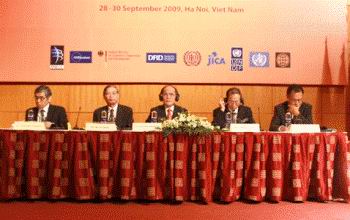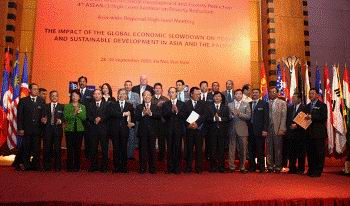Asian-Pacific economies join hands to address global economic crisis
VGP - Over 350 delegates from 28 economies, 25 development organizations and 13 non-governmental organizations gathered in a Forum on impacts of the global economic slowdown against poverty reduction and sustainable development in Asia and the Pacific region which opened this morning in Hà Nội.
 |
|
Deputy PM Nguyễn Sinh Hùng (center) at the forum on impacts of the global economic slowdown against poverty reduction and sustainable development in Asia and the Pacific region, Hà Nội, September 28, 2009 – Photo: VGP |
The first forum of its kind ever held in the region, taking place on September 28-30, is a good chance for the regional economies to share information and propose initiatives and measures to cope with negative impacts of the crisis on rural development and poverty reduction.
Joint efforts and cooperation - key factors to success
Addressing the event, Vietnamese Deputy PM Nguyễn Sinh Hùng said that the economic downturn has spread to every corner of the world, damaging people’s life, weakening socio-economic achievements, and particularly putting rural residents at a high risk.
The economic storm has resulted in high unemployment rate, widespread re-impoverishment, and social instability, making it difficult for countries around the world to realize the United Nations’ Millennium Development Goals, he remarked.
He called on further solidarity and cooperation on the global and regional scales to push back these challenges.
Regional countries should map out proper roadmaps, pour more money and draw foreign financial assistance as well to bolster rural development and alleviate poverty, Deputy PM Hùng suggested, saying these are ways to ensure sustainable progress in each country and the region as a whole.
He suggested the regional countries generate more job, raise sustainable funds for healthcare and education, upgrade rural infrastructure and social welfare system, and improve people’s material and spiritual life.
 |
|
Delegates to the forum on impacts of the global economic slowdown against poverty reduction and sustainable development in Asia and the Pacific region,, Hà Nội, September 28, 2009 – Photo: VGP |
Việt Nam’s lessons
Regarding Việt Nam’s lessons, Deputy PM Hùng said that over 70% of the country’s population live and work in rural areas, thus rural development and poverty reduction are among the most important pillars for growth and sustainable development strategy here.
During the past years, Việt Nam has issued a number of policies which are translated into concrete programs and projects with the sole objective to give a new face to rural areas.
In the context of the global economic crisis, Việt Nam has focused its assistance on the poor and most vulnerable groups. Some key projects include a dedicated investment program for 62 poorest districts nationwide, housing program for low-income groups, and vocational training program for farmers, stated the Vietnamese Deputy PM.
During the three-day event, participants will center on key issues like impacts of the global economic crisis on the regional socio-economic performance, gender, labor, employment, education and training.
By Hải Minh

